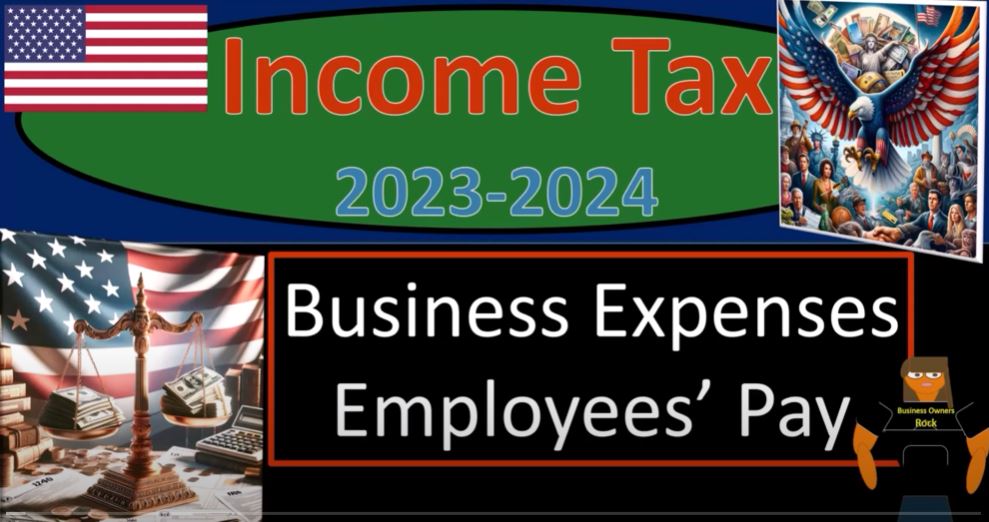Welcome to your ultimate guide for maximizing your business tax refund for the 2023-2024 tax season! Grab a cup of coffee and get ready to dive into the details of income tax preparation, focusing on business expenses, employee pay, and key deductions.
Most of the information you need can be found in IRS Publication 946, which covers how to depreciate property, section 179 deductions, special depreciation allowances, MACRS (Modified Accelerated Cost Recovery System), listed property, and more. Visit the IRS website at irs.gov for comprehensive details.
Understanding the Income Tax Formula
At its core, the income tax formula resembles an income statement: income minus expenses equals net income. For tax purposes, however, it’s income minus various deductions that results in taxable income. As a sole proprietor, your Schedule C (Profit or Loss from Business) rolls into line one of the income tax formula on Form 1040, which ultimately impacts your taxable income.
Employee Pay and Payroll Taxes
One of the key expenses for businesses is employee pay. Understanding how to handle this can significantly impact your tax preparation and deductions.
Sole Proprietorship and Employee Pay
As a sole proprietor, you do not typically issue yourself a W-2 form and are not considered an employee of your business. Instead, you pay self-employment taxes, which include both the employee and employer portions of Social Security and Medicare, calculated on Schedule SE.
Distinguishing Employees from Contractors
When you hire help for your business, you must decide whether they are employees or contractors. Employees give you more control over their work but require you to handle payroll taxes and withholdings. Contractors, on the other hand, typically have more independence, but you must ensure they meet the criteria set by the IRS to avoid misclassification.
Deducting Employee Pay on Schedule C
You can generally deduct the pay you give your employees for services performed for your business on Schedule C. However, this pay must meet the following criteria:
- Ordinary and Necessary Expense: It must be a common and accepted expense in your trade or business.
- Reasonable Pay for Services Performed: The compensation must be reasonable and directly related to services performed.
Handling Fringe Benefits
Fringe benefits are additional forms of compensation provided to employees, which can also be deducted. Examples include health insurance, educational assistance, and retirement plans. Some fringe benefits can be excluded from employee wages, providing tax advantages for both the employer and the employee.
Types of Deductible Fringe Benefits
- Health Plans: Including accident and health plans.
- Retirement Plans: Contributions to employee retirement plans.
- Education Assistance: Tuition reimbursement or education assistance programs.
- Group Term Life Insurance: Coverage provided to employees.
- Dependent Care Assistance: Programs helping employees with dependent care expenses.
For detailed information on fringe benefits and their tax implications, refer to IRS Publication 15-B.
Property and Depreciation
Depreciating business property can provide significant tax benefits. Key sections to understand include:
- Section 179 Deduction: Allows you to deduct the full purchase price of qualifying equipment and software purchased or financed during the tax year.
- Special Depreciation Allowance: Provides an additional deduction for certain qualified property.
- MACRS: A method of depreciation for tangible property placed into service after 1986.
Preparing for Tax Season
To maximize your refund and ensure compliance, consider the following steps:
- Organize Your Records: Keep detailed records of all income, expenses, and employee pay.
- Understand Payroll: Ensure you are handling payroll taxes correctly and issuing the necessary forms (e.g., W-2s for employees).
- Consult Professionals: Work with a tax professional or accountant to navigate complex deductions and depreciation rules.
By understanding the intricacies of business expenses, employee pay, and depreciation, you can set your refund to the max for the 2023-2024 tax season. For more detailed guidance, refer to IRS publications and consult with tax professionals.
Happy tax filing!

